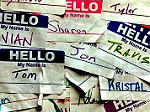by Melissa Mesku
Clarice Lispector once wrote, “I’m not a synonym—I’m a proper noun.” Like many of her oblique declaratives, the meaning resonates if you are inclined to hear it. Yet even to those who do, what they hear differs widely. Perhaps even more maddening, it is subject to change when it is heard again. Lispector as haughy and indignant. Lispector, tall, set apart from the crowd. Lispector, a singular thing. It is disappointing there are no good synonyms for synonym, because the Lispectors I can invent, over and over, belie a multiplicity. Her writing becomes a veil that, if I cannot see underneath, I can project onto. Hence the difficulty of naming oneself. You can proffer a proper noun, but the entire world has nothing but synonyms for you.
Last week brought the launch of Words Without Borders’ ninth annual Queer Issue. Aside from the unifying theme, many of the issue’s genre-defying works also share a focus on naming. In “While He Was Sitting There” by Mortada Gzar, the narrator names and renames himself with every soldier he meets. If someone asks about him, he will know who by which name was used. We may be forgiven for seeing this as coquettish (one of the soldiers likes his many names, “repeating each with appreciation”), or merely as an undisclosed means of protection. But it may be something else entirely. The side effects of war have left their mark on the soldiers, and the narrator’s own name—changing from Jibran to Miran, or Uftan, then to Zabdan, Shahman, Kashamshan—may itself be read as a side effect, not of the greater war, but of his own private one.
In Prabda Yoon’s “Belly Up,” the story opens with an explanation of the main character’s name, ’Mantique. When she speaks about herself, she doesn’t say “I,” she says “’Mantique.” The absence of the pronoun we take for granted, the only one that feigns to be both pronoun and proper noun, explains a significant point: “[E]very sound that found its way out of her mouth really communicated ’Mantique’s thoughts, not Man’s, not those of Apichart Piangwang—the full name on her national ID card.” Her conception of self is strong; she speaks about herself almost effusively and deeply owns her persona. Yet that persona has not merged into “I.”
Though anyone can inhabit the singular pronoun, there is only room for one. That ’Mantique eschews using it implies that, despite her disavowal of her male birth name (merely “a technical error, a flub”), a multiplicity remains. Speaking about oneself in the third person, then, could be read as a concession. Unless, of course, she is the third person: not Man, not Apichart Piangwang, but ’Mantique, the third and final incarnation. As a maneuver, this is not without its difficulties. Yoon’s prose exposes this in the way it jumps in and out of italics. It isn’t easy to tell who is talking: the omniscient narrator, or ’Mantique herself. An inadvertent by-product, a side effect, of being ever the proper noun.”
“Nihilism” is another noteworthy piece in this issue. Poet Nhã Thuyên presents a compelling portrait of someone while avoiding labeling that someone with any pronoun at all. Such a thing can be done by allowing the subject to speak in their own voice, resting within their own genderless and unspecific “I,” but that is not what transpires here. In one breathless sentence, Thuyên presents two characters: a narrator and another person, referred to as “that one.” Translated from the Vietnamese, a word central to this work—hắn—has no English equivalent. Hắn, “a third-person-singular and gender-neutral term that remains both familiar and human,” sounds innocuous enough. In its place, this translation relies on the repeated use of “that one.” Those words, while technically neutral, in this work take on a strong connotation of disdain, of the violence of denying someone their subjectivity. It is fitting, as Thuyên’s construction, with every word, ultimately negates the both of them. Thuyên’s “Nihilism” reveals there are many synonyms for the proper noun, even if you’re not one of them.
These works, brought together under the banner of an annual Queer Issue, reveal that the conundrum of identity and naming is itself far more than a queer issue. The universal multiplicity of self is not outdone even in its negation, for it only multiplies the complexity we face in naming and being named.
Image by Travis Wise.

Leave a comment